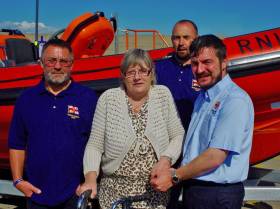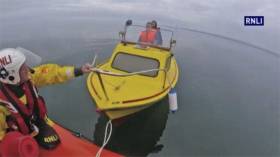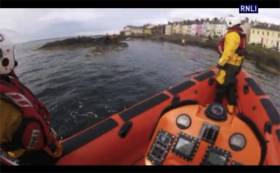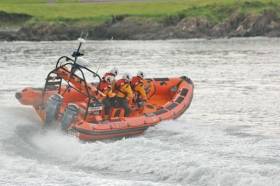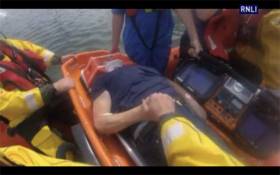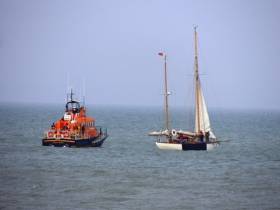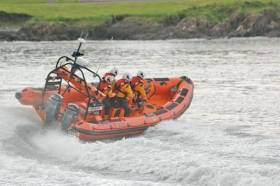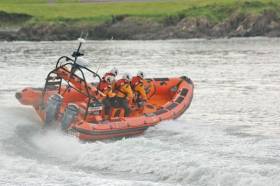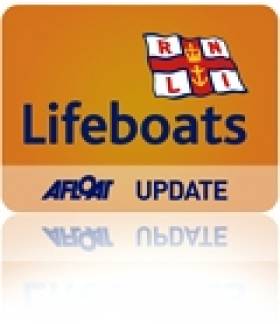Displaying items by tag: Bangor
Ballyholme Beach Faller Thanks Bangor Lifeboat Crew For Her Rescue
#RNLI - Geraldine Donnelly paid a visit to Bangor RNLI earlier today (Thursday 25 August) just weeks after her rescue following a serious fall on Ballyholme beach.
On 7 June last, Donnelly fell more than two metres onto rocks and shingle from Ballyholme Esplanade after one of her two dogs pulled its leash and over-balanced her, as previously reported on Afloat.ie.
After five weeks in the Ulster Hospital and another four receiving physiotherapy, Donnelly is now back on her feet, although full recovery could be a year away.
Today she met three of the lifeboat crew involved in her rescue – helm Mickey McKenna, John Bell and Richard McClinton. A fourth crew member, Ian Browne, sent his regards as he is currently working overseas.
"As soon as I fell, I knew it was serious, and if it wasn’t for the RNLI, I really don’t think I’d be alive today," she said today as she praised the Bangor RNLI crew for their actions, in particular "her angel" John Bell, who held her hand throughout her ordeal.
"Every day since the accident, I’ve wanted to thank you for your kind words and for holding my hand," she said. "It made such a difference, and kept me calm; something the doctors say prevented the injury being even worse."
Bangor Lifeboat Rescues Two After Motorboat Breakdown
#RNLI - At 7:30am yesterday morning (Saturday 23 July), Bangor RNLI was requested by HM Coastguard to attend a boat off Carrickfergus in Belfast Lough, following the firing of a red distress flare.
On arrival at the scene, the volunteer crew were able to confirm that the boat, with two men on board, had fired the flare.
The men had left Carrickfergus early yesterday evening in calm conditions, but then suffered the loss of their main engine, followed by the failure of the auxiliary outboard.
After several hours trying to fix the problem without success, and with no working mobile phone or radio, they decided to wait until morning to fire a flare to attract attention.
The crew quickly rigged up a line between the stricken vessel and the Bangor lifeboat Jessie Hillyard, and towed them to Carrickfergus Marina. Just outside the marina they tied the motorboat alongside for better manoeuvrability in the close confines of the marina.
Bangor RNLI helm Gareth Whan said: “The crew and I are happy to have brought these men to safety, after what must have been a fairly miserable night for them on board a boat with no power in Belfast Lough.
“Incidents like this highlight the importance of ensuring your engines are in good working order, and the need to have a reliable way of calling for help if things go wrong.
"Luckily for them, the weather stayed good overnight, and the flare was spotted this morning.”
Previously the Bangor lifeboat was called out to rescue boys trapped on rocks while fishing last weekend, as reported on Afloat.ie.
Bangor Lifeboat Rescues Boys Trapped On Rocks
#RNLI - It was just a routine exercise for Bangor RNLI's volunteer lifeboat crew on Sunday night (17 July) until they got the call to rescue two young boys who were cut off by a rising tide while fishing at The Long Hole on Belfast Lough.
With assistance from HM Coastguard, the lifeboat was able to rescue the boys and return them safely to Bangor Marina.
Bangor RNLI volunteer lifeboat press officer Peter Semple said: "The crew and I were delighted to be able to put their training to use, particularly in such a rocky part of the coast.
"Although the boys were in no immediate danger, and their only concern after we got them back to dry land was that they got their fishing rods back, it is important for parents to explain the risks of being caught by a rising tide."
Bangor's lifeboat crew on this callout were helm Peter Semple with Dave Beale, Kat Lindsay and Alison Stobie.
#RNLI - Bangor RNLI assisted four people who got into difficulty on a broken-down motorboat on Belfast Lough on Monday evening (13 June).
The volunteer lifeboat crew launched at 10.25pm to rescue the 19ft motorboat just off the Cloghan Jetty.
The boat, with four people on board, had lost all power and was drifting in fog close to the shore.
Arriving at the scene, guided only by the light from a mobile phone, the crew of the relief Bangor lifeboat Tabby Cat took the motorboat under its control and returned it and its and crew safely to Carrickfergus Marina.
Speaking following the callout, Bangor RNLI helm Peter Semple said: :The crew and I are delighted that we were able to return these people to the safety of the marina. Although it was a calm night, it was dark, and Belfast Lough is not a great place to be if you can’t be seen.
"It is important to ensure that, if you lose all power you still have some way of being seen and making contact with the shore."
In other news from Bangor, the lifeboat station was recently visited by a man rescued a fortnight ago by one of its volunteers after he suffered a heart attack at sea.
Tim Bailie was on a weekend pleasure cruise between Carrickfergus and Bangor with his family at the end of May when he was taken ill.
But thanks to the quick action of helm Kyle Edwards and his crew, Bailie is still here to tell the tale in his own words, as per the video below:
#RNLI - Bangor RNLI’s volunteer lifeboat crew were called out yesterday afternoon (Tuesday 7 June) to assist in the rescue a woman who had fallen from the coastal path at Ballyholme Esplanade onto the rocky beach below.
The woman is believed to have fallen after the dog she was walking pulled on its lead and she over-balanced and slipped more than two metres to the rocky beach below.
Bangor RNLI relief lifeboat Tabby Cat was launched at 2:20pm and arrived on scene in Ballyholme Bay where NI Ambulance Service paramedics were treating the woman. They were later joined by the fire service and coastguard, who waited on standby in case their services were needed.
After the paramedics had stabilised the woman on the beach and were happy that she could be lifted, the decision was made to move her on a stretcher onto the lifeboat and take her to the jetty at Ballyholme Yacht Club, as this was considered safer than attempting the steps at the esplanade.
At the yacht club, the casualty was lifted up the jetty to the waiting ambulance and taken to Ulster Hospital.
Bangor RNLI helm Micky McKenna said: “The crew and I are delighted to have been able to assist this woman, and we wish her well with her recovery.”
Arklow & Bangor Lifeboats Have Busy May Day Weekend
#RNLI - Lifeboats from Arklow and Bangor were out on the water for separate callouts on May Day yesterday in what made for a busy weekend for the RNLI crews.
In Arklow, RNLI lifeboat volunteers were alerted by pager around 7pm on a fine Sunday evening (1 May) to a call for help from a vintage sailing vessel.
The lifeboat Ger Tigchleaar was launched within minutes to the classic boat, which has suffered engine failure and was stranded just east of Arklow Harbour.
The Arklow RNLI volunteer crew established a tow line and proceeded to tow the vessel safely back into Arklow. The five experienced crew members on the casualty vessel remained aboard during the tow home and all hands came ashore safely at Arklow.
Speaking after the incident, volunteer lifeboat press officer and community safety officer Mark Corcoran said: "On this, the RNLI’s Mayday fundraising weekend, our fundraising team and boats crew have been busy with all kinds of fundraising events.
"Even after a long day of fundraising our dedicated volunteers turned up this evening en masse to go to the aid of the crew of this stricken vessel.
"We’re all very proud to be involved with the RNLI, so please give generously to the Mayday campaign to help keep us doing what we do, which is saving lives at sea."
Elsewhere on the same evening, Bangor RNLI’s volunteer lifeboat crew launched to the aid of a RIB with engine failure just off Royal North Yacht Club in Belfast Lough.
Although not in immediate danger, a strong breeze was blowing the vessel, with one person on board, offshore. Thankfully the Bangor inshore lifeboat was able to tow the RIB in to Royal North without incident.
Bangor RNLI volunteer helmsman Gareth Whan said: “The crew and I are delighted to have been able to return this vessel safely to shore. Engine failure can happen in the best-maintained boat, and we are pleased to have been able to help.”
This was Bangor RNLI’s second callout of the weekend. On Friday evening (29 April) they were asked by Belfast Coastguard to assist Lagan Search and Rescue and other emergency services in a detailed search of Belfast Harbour for a person in the water.
Sadly, this callout did not have a happy ending. The search was called off after three hours, and resumed on Saturday morning. However, it was only yesterday (Sunday 1 May) when a body was found by police divers.
Bangor RNLI extended its sympathies to the family of the man and all involved in the attempted rescue.
“It is sadly appropriate that both of these launches happened during the May Day weekend, a key fundraising time for the RNLI, and highlight the importance of the work our volunteers do,” said Bangor's deputy launching authority Bryan Lawther.
#RNLI - Bangor RNLI’s volunteer lifeboat crew launched at 7pm on Tuesday evening (5 April) to help in the rescue of a yacht whose engine had failed on passage from Stranraer to Bangor on Belfast Lough.
Bangor RNLI’s lifeboat operations manager Kevin Byers was first made aware of the situation by Belfast Coastguard at 5pm when the yacht was 15 miles northeast of Bangor, and knew that it had been taken in tow by the inbound fishing trawler Aurelia.
As the Aurelia was too large to bring the yacht all the way in to Bangor Marina, the Bangor lifeboat was launched just after 7pm to complete the rescue.
The yacht, with two adults and two children on board, was under power as there was little wind and the sea was calm. Unfortunately, the engine stopped and they were being carried by the tide.
Bangor RNLI's volunteer helm Gareth Whan said later: “This was a great example of good teamwork. Luckily, the Aurelia was able to bring the yacht most of the way, and we were able to complete the job, bringing it safely into Bangor Marina.
“Unfortunately, regardless of your preparation, engines can break down, and the lifeboat crew were all delighted to bring this group of people safely ashore."
Bangor Lifeboat Aids Fishermen After Engine Failure
#RNLI - Bangor RNLI’s volunteer lifeboat crew were requested by Belfast Coastguard to help two fishermen on a 17ft motorboat with engine failure.
Although conditions were calm and the crew were in no immediate danger, the westerly wind was extremely cold and blowing the fishing boat offshore.
The call to lifeboat operations manager Kevin Byers came in at 5.06pm yesterday evening (29 March) and the lifeboat launched at 5.15pm.
The lifeboat made its way to the reported position to the south of the Gobbins outside Belfast Lough, only to find the boat wasn’t there, and they were only able to locate it by radioing the boat for a position update.
On arrival, the volunteer lifeboat crew made sure the boat and crew were sound, and towed the boat to Carrickfergus Harbour, where they were thanked by an extremely grateful skipper.
Helming Tabby Cat, the temporary replacement for Bangor's regular lifeboat Jessie Hillyard, Bangor RNLI crewmember Gareth Whan said: “An incident like this emphasises the importance of good engine maintenance, particularly as many boats have been unused over the winter months.
“It also demonstrates the importance of warm clothing, as the crew of the rescued boat were extremely cold by the time we reached them – it is always much cooler on the water than it is on dry land.”
Bangor, Larne & Donaghadee Lifeboats Launch To Air Emergency
#RNLI - Lifeboats from Bangor, Donaghadee and Larne were launched last night (Tuesday 27 October) as part of a major operation after a flight out of Belfast declared an emergency.
Police, fire and ambulance crews were also involved in the cross-agency response to the British Airways flight from Belfast City Airport to Heathrow, with 108 passengers aboard, which diverted to Belfast International Airport shortly after take-off as the pilot declared an emergency.
The RNLI lifeboats were on the water within 10 minutes of receiving a request from HM Coastguard and proceeded to positions which are part of a practiced air emergency plan.
Thankfully the services of the volunteer crews were not required and the lifeboats returned to station within the hour.
Alan Whiteside, operations director at Belfast International Airport, said: "Everything went smoothly, our own police and fire service on site here responded, the Northern Ireland Fire and Rescue Service, the PSNI, the Northern Ireland Ambulance Service all attended as a routine.
"But nobody was required to take any other action - the aircraft landed safely, thankfully."
Bangor RNLI Celebrates 50 Years Of Lifesaving
#RNLI - On Friday 5 June, Bangor RNLI’s volunteer lifeboat crew, fundraisers and supporters gathered at the Marine Court Hotel to celebrate 50 years of saving lives at sea.
Records held in the archives of Bangor lifeboat station indicate that a lifeboat in Belfast Lough was first established at Groomsport in 1858, following the wrecking of a vessel near Bangor, with the loss of all the crew and in full view of local people standing on the shore.
Groomsport lifeboats launched 55 times and saved 87 lives over a period of 62 years from 1858 to 1920, when the station was closed.
It was reported that the number of lifeboat services were not more numerous due to the great number of fisherman and pilots in the area "of a fine and hardy type, who are not slow to risk their lives in their own boats, in which they have great confidence."
Some 45 years after the closure of Groomsport Lifeboat Station, an ever-increasing demand for lifesaving services along the coast led to considerations of re-establishing a lifeboat service in the Belfast Lough area.
Under the guidance of Ernie Hay, the first honorary secretary and North Down Borough Council officer, the RNLI chose to place a D-Class inflatable lifeboat at Bangor Harbour, opening for business on 15 May 1965.
With the co-operation of North Down Borough Council, the lifeboat was stored in the Tower House yard and was launched on a trolley at the slipway beside the old Harbour Masters Office. The co-operation between North Down Borough Council and the RNLI has continued without a break since those times.
The service of the lifeboat continued under the care of local volunteers and the demands put upon her volunteer crew increased year on year. Successive honorary secretaries managed the operational demands and the branch fundraising committee and ladies’ guild worked hard behind the scenes, raising the funds to cover operational costs. Over 40 local businesses also contributed to the funds by maintaining collecting boxes on their premises.
In 1984, following the construction of the Eisenhower Pier, North Down Borough Council built a new boathouse and slipway, which allowed for the subsequent upgrading of the boat to an Atlantic 21 class lifeboat, the then ‘Rolls Royce’ of fast inshore lifeboats.
The Youth of Ulster, a new boat funded by local donations, was put on station in 1990 and was formally named by HRH Prince Edward, Earl of Wessex in 1991.
In 2002 the RNLI invested £250,000 in building a new boathouse and crew facilities on a site kindly granted by North Down Borough Council. This boathouse was designed to accommodate the latest class of fast response inshore lifeboat.
Bangor RNLI celebrated its 40th anniversary in 2005 and, as a reflection of its fine service record since its foundation, in 2006 Bangor took delivery of the first Atlantic 85 class lifeboat in Ireland, the Jessie Hillyard. The new class of fast response inshore lifeboat costing over £120,000 was made possible through a legacy from Eileen Freeman in memory of her late mother Jessie Hillyard.
That same year, Bangor RNLI was the busiest lifeboat station out of all the 43 stations in Ireland, launching 53 times. From 2007 RNLI Bangor Lifeboat has been the busiest lifeboat out of the eight coastal stations in Northern Ireland.
Since the foundation of the station 50 years ago, over 110 local people have served as crew members. To date, over the years, Bangor lifeboats have launched 1,252 times, rescued over 1,000 people and saved 191 lives.
Everyone connected with Bangor RNLI – the crew, station management, fundraisers and helpers – are all volunteers, giving freely of their time, braving all weathers, 24 hours a day, 365 days a year to help save life at sea.
Currently there are 20 crew members, male and female, from all walks of life including, among others, a council officer, a restaurateur, a plumber, a solicitor, a care worker, a satellite television engineer, a lorry driver and an orthopaedic surgeon.
RNLI volunteers continue to support annual seafront events, raise funds for other RNLI lifeboats and local organisations and, for 50 years, have played a vital part in Bangor’s maritime and community affairs.



























